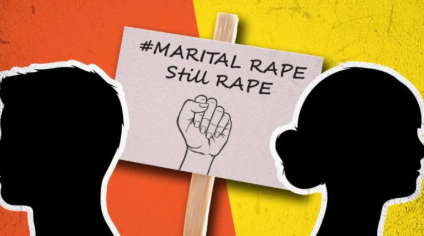The Exception to Marital Rape: A Critical Examination (GS Paper 2, Governance)

Overview
- The Supreme Court of India is currently addressing a pivotal issue: whether non-consensual sexual acts within marriage should be criminalized as rape.
- This discussion challenges longstanding legal doctrines and cultural norms surrounding marriage and consent.
- Justice J.B. Pardiwala's inquiries into the inconsistencies in the legal treatment of sexual violence reveal a pressing need for reevaluation of the Marital Rape Exception (MRE).
Historical Context
- The roots of the MRE can be traced back to colonial English law, specifically the "doctrine of coverture."
- This legal principle historically viewed a married woman’s legal identity as subsumed under that of her husband, stripping her of autonomy and rights.
- In the 18th century, jurist Matthew Hale argued that marriage entailed irrevocable consent to sexual relations, a view that has shaped legal discourse for centuries.
- Although England abolished the MRE in 1991, India has retained it, perpetuating a legal framework that enables marital violence.
- This historical context is critical to understanding how these outdated notions continue to affect women's rights today.
Statistics on Marital Violence
- Recent findings from the National Family Health Survey-5 (2019-2021) are particularly alarming.
- Approximately one-third of married women in India report experiencing physical or sexual violence from their husbands.
- This statistic underscores the widespread nature of the issue, illustrating how deeply embedded norms about marriage and male authority contribute to violence against women.
- Moreover, global statistics indicate that around 75% of all sexual assaults occur within intimate settings, often perpetrated by someone known to the survivor.
- This reality highlights the urgency of reforming laws surrounding consent and violence in marriage.
Current Legal Framework
- The Indian legal framework, particularly Sections 375 of the Indian Penal Code (IPC) and Section 63 of the Bharatiya Nyaya Sanhita, effectively grants husbands legal immunity for non-consensual sexual intercourse with their wives if they are over 15 or 18 years old, respectively.
- This legal loophole means that married women are denied the same protections afforded to others under the law, leaving them vulnerable to abuse.
- Although married women can seek redress under other laws, such as the Protection of Women from Domestic Violence Act, these provisions are limited in scope and effectiveness.
- They do not adequately address the specific context of marital rape, which requires a more robust legal framework to ensure protection and justice.
Issues and Concerns
The current legal landscape raises significant concerns regarding women's rights and protections. Petitioners challenging the MRE assert that the existing laws violate fundamental rights, specifically:
- Article 14: Guarantees equal protection under the law, which is compromised by the MRE.
- Article 15(1): Prohibits discrimination on the grounds of sex, highlighting the inequity faced by married women.
- Article 21: Affirms the right to privacy and bodily integrity, fundamental to any discussion of consent.
Critics argue that the MRE not only undermines women's autonomy but also perpetuates harmful stereotypes about marriage and consent. By failing to recognize a married woman’s right to refuse sex, the law implicitly endorses the idea that marriage equates to perpetual consent. Advocates assert that acknowledging a woman’s right to withhold consent would strengthen the institution of marriage rather than threaten it.
Government’s Position
- The central government has expressed strong opposition to abolishing the MRE.
- Officials argue that doing so could destabilize the institution of marriage and lead to a surge in false allegations.
- They advocate for viewing marital rape as a social issue rather than a strictly legal one, suggesting that societal attitudes must change before legal reform can be effective.
- This position reflects a broader societal discomfort with addressing issues of consent and autonomy within marriage, often rooted in traditional beliefs about gender roles and family structures.
Judicial Observations
- Judicial attitudes toward marital rape have begun to shift.
- Chief Justice D.Y. Chandrachud has highlighted the inconsistencies in the law, pointing out that acts considered rape when perpetrated by strangers should similarly be recognized in cases involving husbands.
- Previous Supreme Court rulings have acknowledged that violence in intimate relationships can constitute rape, indicating a growing recognition of the need for reform.
- For instance, a 2022 ruling by the Karnataka High Court allowed for the prosecution of husbands for marital rape, setting a precedent that could influence future legal interpretations.
Future Outlook
- The Supreme Court's ongoing deliberations present a critical opportunity to assess whether the MRE violates fundamental rights and to consider potential avenues for reform.
- The court may choose to create a new legal offense that explicitly addresses marital rape or to align existing laws more closely with constitutional values.
- Such reforms could represent a significant advancement in women's rights in India, acknowledging their autonomy and right to protection from violence.
- The outcome of this legal battle will not only affect the legal status of marital rape but also have far-reaching implications for societal attitudes toward marriage, consent, and gender equality.
As the court grapples with these issues, the discourse surrounding marital rape is likely to evolve, prompting broader conversations about women's rights, societal norms, and the importance of consent in all relationships. The stakes are high, as the decision has the potential to redefine the boundaries of autonomy and protection for countless women across the nation.


